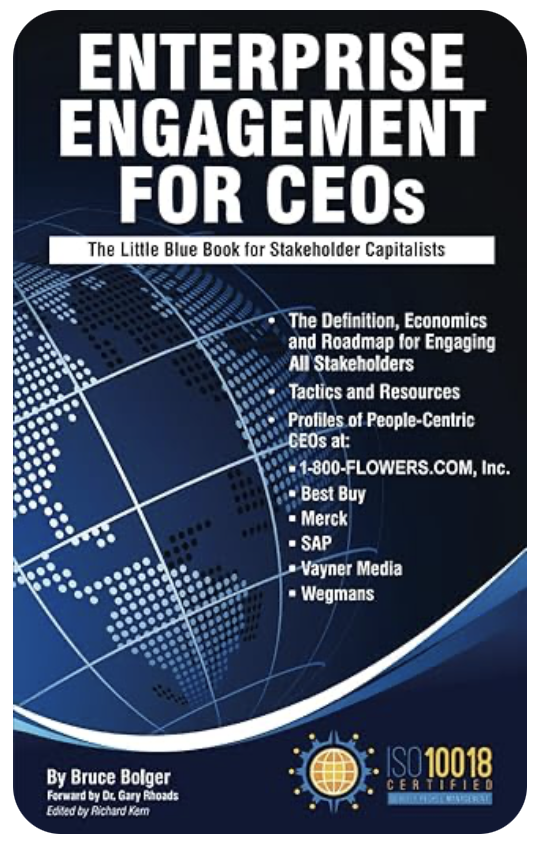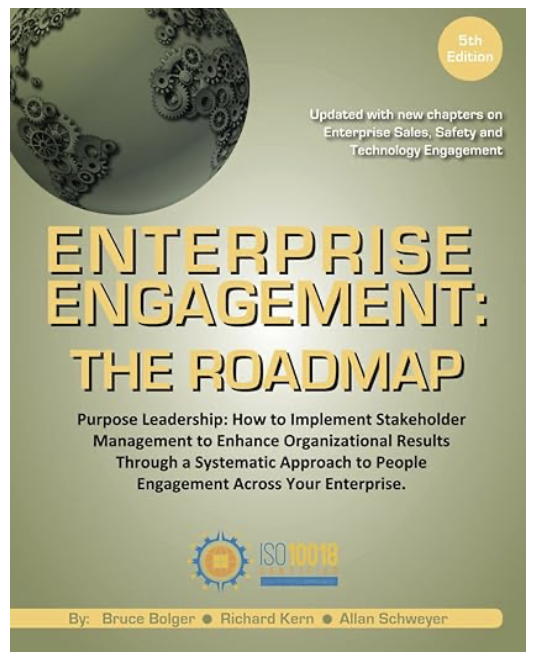Opinion: Why Conservatives Should Embrace Stakeholder Capitalism, the Golden Rule in Business
 When asked in surveys by the JUST Capital think tank and outreach group what people want from business, a large majority in both political parties want companies to produce safe products, provide good service, price their products fairly, treat their employees and other stakeholders well, and be good citizens in the communities where they operate. This is stakeholder capitalism.
When asked in surveys by the JUST Capital think tank and outreach group what people want from business, a large majority in both political parties want companies to produce safe products, provide good service, price their products fairly, treat their employees and other stakeholders well, and be good citizens in the communities where they operate. This is stakeholder capitalism. By Bruce Bolger
The Power of a Press Release
10 Reasons Why Conservatives Should Embrace Stakeholder Capitalism
Click here to subscribe to the ESM weekly e-newsletter.
 The Enterprise Engagement Alliance is non-partisan, so we were surprised when the concept of stakeholder capitalism came under attack mostly from the right. We could understand the opposition from the left, which is based on a fundamental disbelief that capitalism can ever be a force for good and on the assumption that any claims to the contrary are virtue signaling. Why would the right oppose a movement to demonstrate that capitalism indeed can create a virtuous circle of prosperity if it focuses on enhancing returns for investors by creating value for all stakeholders and the environment rather than by extracting it for the benefit of a few.
The Enterprise Engagement Alliance is non-partisan, so we were surprised when the concept of stakeholder capitalism came under attack mostly from the right. We could understand the opposition from the left, which is based on a fundamental disbelief that capitalism can ever be a force for good and on the assumption that any claims to the contrary are virtue signaling. Why would the right oppose a movement to demonstrate that capitalism indeed can create a virtuous circle of prosperity if it focuses on enhancing returns for investors by creating value for all stakeholders and the environment rather than by extracting it for the benefit of a few. The practical application of stakeholder capitalism over the decades by companies such as Costco, Delta Airlines, Nucor Steel, Chick-fil-A, Wegman’s and many others (see list of EEA Golden Rule Leaders) demonstrate why we would feel conservatives and people of all political stripes would embrace a practical way to improve business and society. A focus on enhancing returns for investors only by creating value for customers, employees, distribution and supply chain partners, and the environment is nothing but consistent with the application of the Golden Rule in business, certainly a fundamental value in conservatism, along with the caveat of Milton Friedman everyone seems to have overlooked.
In 1970, Milton Friedman argued in the famous New York Times article “the social responsibility of business is to increase its profits.” Everyone seems to forget that he also wrote, “So long as it stays within the rules of the game, which is to say, engages in open and free competition without deception or fraud.” Most would agree that many business actors fail to meet these standards in their marketing or business practices.
Shareholder capitalists overlook another key aspect of Friedman: His belief that taking care of stakeholders can so vitally contribute to profits that is is hypocritical for companies brag about it. “Of course, in practice the doctrine of social responsibility is frequently a cloak for actions that are justified on other grounds rather than a reason for those actions. To illustrate, it may well be in the long‐run interest of a corporation that is a major employer in a small community to devote resources to providing amenities to that community or to improving its government. That may make it easier to attract desirable employees, it may reduce the wage bill or lessen losses from pilferage and sabotage or have other worthwhile effects. Or it may be that, given the laws about the deductibility of corporate charitable contributions, the stockholders can contribute more to charities they favor by having the corporation make the gift than by doing it themselves, since they can in that way contribute an amount that would otherwise have been paid as corporate taxes.”
The Power of a Press Release 
A single press release from the Business Roundtable set back a decades-old movement to enhance capitalism by confusing everyone. As this analysis of published opponents to stakeholder capitalism, almost all of them have either mentioned no source for their definition of the concept or have referred solely to the Business Roundtable Aug. 18, 2020 redefinition of the corporation to address the needs of all stakeholders.
In the rush to respond, observers both in support and in opposition stated their cases without in one instance we can find referring to a source for their definition other than the Business Roundtable’s press release, itself citing no specific source for its definition. Even opponents to stakeholder capitalism, such as Lucien Bebchuk, Professor of Law at Harvard University School of law, and Wayne Winegarden, of the Wayne Winegarden is Senior Fellow and Director Center for Medical Economics and Innovation at Pacific Research Institute admitted to ESM that stakeholder capitalism as the EEA defines it is nothing new and simply better business.
That’s correct. The left and the right hinged their entire arguments solely on a single press release without any exploration of the well over 100 research and other articles on the subject going back to the work of Peter Drucker in 1940s, who put the pursuit of customers above even shareholders in his practical management theory.
Their major arguments have hinged on their interpretation that stakeholder capitalism means diverting profits that should go to shareholders to the pet causes of the C-suite or that it means "balancing" the interests of stakeholders in an untenable manner. In fact, if opponents took the time to seriously study the field, they would realize their opposition was based on their interpretation of a single press release, not upon the facts. Nowhere in the literature on stakeholder capitalism can anyone find a mention of obligating companies to give to social causes. And, when it comes to the issue of "balancing Interests," in fact it is rather about harmonizing the interests of all stakeholders on a common purpose, goals, objectives and values. Ironically, shareholder capitalists are those most likely to balance interests as opposed to harmonize them. The major US automakers strike in 2023 provides a useful example. The strike is estimated to have cost the industry about $9 billion. That’s about the same as the publicly held auto companies are estimated to have spent in stock buybacks over the three years before the strike. What if they had used some of that stock buyback money to preemptively address the issues leading to the strike by better aligning the interests of the workers with those of the organization?
10 Reasons Why Conservatives Should Embrace Stakeholder Capitalism
Unless anyone opposes the application of the Golden Rule in business, it’s difficult to find a reason why any conservative could not embrace stakeholder capitalism principles. For business people, it is most easily described as total quality management for business, a strategic, systematic and holistic approach to success by harmonizing the interests of all stakeholders toward a common purpose, goals, objectives, and values.
1. It is just better business—Going back 70 years or more, stakeholder capitalism has nothing to do with “woke” capitalism. It’s about enhancing returns for investors by creating value for those upon whom we depend to create wealth: customers, employees, supply chain and distribution partners, and communities. Stakeholder capitalists perform better over time, as demonstrated by multiple studies,because they engage the people whose purchases or work actually create the wealth, rather than finding ways to manipulate them and extract wealth.
2. It’s based on the Golden Rule fundamental to the faithful of almost all religions along with atheists and agnostics: Stakeholder capitalists make money by treating others as we would ourselves like to be treated; i.e., by creating wealth in a way that motivates the stakeholders critical to helping us produce that wealth in the first place. This is in contract to the common practice of extracting wealth from them and the environment in a way that lessens their commitment to our success and postpones inevitable liabilities.
3. It’s practical and sensible. The world of ISO 9001 quality management standards and the ISO 10018 people engagement and ISO 30414 human capital standards are hardly revolutionary: they provide a practical implementation framework that saves time and money, enhances return on investment, while creating better experiences for all stakeholders.
4. It’s voluntary. ISO and related standards are not required, nor are audits and certification. Let the marketplace decide which types of organizations gain the advantage. Note that while such practices are voluntary, the European Union’s new regulations on stakeholder practices will require detailed disclosures on how many organizations treat their employees; how employees in their distribution and supply chains are treated, as well as their customers and the communities in which they operate, demonstrating the importance such assets play in value creation and risk.
5. No government action is required. Stakeholder capitalists do not require as much regulation, because their goal is not to impose costs on their communities and to view solving problems related to their businesses as opportunities.
6. It lessens the need to raise taxes. Because stakeholder capitalists see paying required taxes as a form of support for the communities upon whose resources their stakeholders depend for infrastructure, health care, defense, and education, and because they pay their employees a living wage, provide healthcare and other support, and minimize their impact on the environment, stakeholder capitalism takes financial pressure off of communities.
7. It’s more transparent. Organizations with clear purpose statements backed up by auditable reporting that share their methodologies, metrics, and continuous improvement processes provide investors and other stakeholders with the information they need to determine if they wish to engage. If investors don’t approve of the purpose, goals, and objectives of the company, they can take their money elsewhere, just as can employees, customers and other stakeholders. There is little hope of success forcing an organization to be something it was never conceived to be.
8. There is less litigation. Basing success on a clearly stated purpose, goals and objectives, and addressing and aligning the interests of all stakeholders toward that common purpose reduces risks of lawsuits, legal fees, because there are fewer complaints and bad press from disgruntled customers, employees, communities, and other stakeholders.
9. It reaffirms faith in free enterprise. There will be less pressure for Democratic Socialism or other forms of autocracy if businesses become a positive force for value creation in their communities.
10. Better experiences for stakeholders and management. By definition, organizations authentically committed to enhancing returns only by creating value for stakeholders offer better experiences everyone, including management. Because stakeholder capitalist companies are run using business operating systems based on a clear organizational purpose, goals, and objectives; specified methodologies and priorities, clear metrics, and a continuous improvement process, there is less time wasted on fire drills, meetings, and infighting. The result—more CEO time for "management by walking around" as well as time home with family and friends.
Enterprise Engagement Alliance Services
 Celebrating our 15th year, the Enterprise Engagement Alliance helps organizations enhance performance through:
Celebrating our 15th year, the Enterprise Engagement Alliance helps organizations enhance performance through:1. Information and marketing opportunities on stakeholder management and total rewards:
- ESM Weekly on stakeholder management since 2009. Click here to subscribe; click here for media kit.
- RRN Weekly on total rewards since 1996. Click here to subscribe; click here for media kit.
- EEA YouTube channel on enterprise engagement, human capital, and total rewards since 2020
 Management Academy to enhance future equity value for your organization.
Management Academy to enhance future equity value for your organization.3. Books on implementation: Enterprise Engagement for CEOs and Enterprise Engagement: The Roadmap.
4. Advisory services and research: Strategic guidance, learning and certification on stakeholder management, measurement, metrics, and corporate sustainability reporting.
5. Permission-based targeted business development to identify and build relationships with the people most likely to buy.
Contact: Bruce Bolger at TheICEE.org; 914-591-7600, ext. 230.














